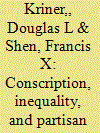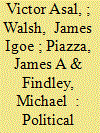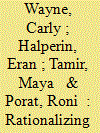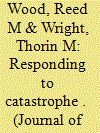|
|
|
Sort Order |
|
|
|
Items / Page
|
|
|
|
|
|
|
| Srl | Item |
| 1 |
ID:
149474


|
|
|
|
|
| Summary/Abstract |
The scientific study of war has largely ignored necessary conditions for war onset. Conflict scholars have previously identified alliances as a mechanism that brings about the initial expansion of war but have not examined whether it is a prerequisite for large wars. We argue that wars diffuse into multiparty wars only in the presence of alliances. In other words, in the absence of any alliance ties, war would not include more than two parties. We put forth a theoretical rationale for this relationship and conduct a series of tests on both dyadic and multiparty wars between 1816 and 2007. These tests provide support for our hypothesis, suggesting that alliances are a virtual necessary condition for multiparty wars: the larger the war, the more likely alliances are a necessary condition.
|
|
|
|
|
|
|
|
|
|
|
|
|
|
|
|
| 2 |
ID:
149475


|
|
|
|
|
| Summary/Abstract |
While recent scholarship suggests that conscription decreases support for military action, we argue that its effect is contingent both on a draft’s consequences for inequality in military sacrifice and on partisanship. In an experiment examining public support for defending South Korea, we find that reinstating the draft significantly decreases support for war among Democrats; however, this effect is diminished if the draft reduces inequality in sacrifice. Support for war among Republicans, by contrast, responds neither to information about conscription nor its inequality ramifications. A follow-up experiment shows that conscription continues to significantly decrease support for war, even in the context of a retaliatory strike against a foreign state that targeted American forces. Moreover, partisanship and the inequality ramifications of the draft continue to moderate the relationships between conscription and public opinion. More broadly, our study emphasizes the importance of examining how Americans evaluate foreign policy–relevant information through partisan lenses.
|
|
|
|
|
|
|
|
|
|
|
|
|
|
|
|
| 3 |
ID:
149472


|
|
|
|
|
| Summary/Abstract |
Why do members of some ethnic groups rebel against the state? One approach holds that groups subject to exclusion from national politics engage in armed conflict. We theorize that the presence of resource wealth moderates the effect of political exclusion. Ethnic groups subject to exclusion whose settlement area includes oil wealth are more likely to experience the onset of armed conflict than groups experiencing exclusion alone. We depart from the convention of cross-national analysis to examine subnational, geocoded units of analysis—ethnic group settlement areas—to better capture the impact of natural resource distribution. Using data on ethnic group political exclusion derived from the Ethnic Power Relations database and geo-coded indicators, we conduct a series of logistic regression analyses for the years 1946 to 2005. We find that exclusion alone increase the likelihood of conflict, while the presence of oil wealth further raises the risk of war.
|
|
|
|
|
|
|
|
|
|
|
|
|
|
|
|
| 4 |
ID:
149477


|
|
|
|
|
| Summary/Abstract |
How does accountability impact political decisions? Though previous research on accountability has demonstrated its potential effects in the realms of business, elections, and more, very little research has explored the effect of citizen accountability in highly ideological, intractable, and political conflicts. This article addresses this issue, looking at the unique interaction between accountability and ideology on Israeli citizens’ political attitudes regarding the Israeli–Palestinian conflict. The results of two experimental studies in Israel reveal that accountable individuals behave in significantly more ideologically partisan ways than their nonaccountable counterparts. Moreover, this polarization is dependent on the specific conflict context, with leftists more affected by the issue of negotiations and rightists by security concerns. This signals that ideological polarization under accountability may depend on the “issue ownership” each ideological group feels toward the specific conflict context and its corresponding social goal of projecting ideological consistency on these issues.
|
|
|
|
|
|
|
|
|
|
|
|
|
|
|
|
| 5 |
ID:
149476


|
|
|
|
|
| Summary/Abstract |
Natural disasters often cause significant human suffering. They may also provide incentives for states to escalate repression against their citizens. We argue that state authorities escalate repression in the wake of natural disasters because the combination of increased grievances and declining state control produced by disasters creates windows of opportunity for dissident mobilization and challenges to state authority. We also investigate the impact of the post-disaster humanitarian aid on this relationship. Specifically, we argue that inflows of aid in the immediate aftermath of disasters are likely to dampen the impact of disasters on repression. However, we expect that this effect is greater when aid flows to more democratic states. We examine these interrelated hypotheses using cross-national data on immediate-onset natural disasters and state violations of physical integrity rights between 1977 and 2009 as well as newly collected foreign aid data disaggregated by sector. The results provide support for both our general argument and the corollary hypotheses.
|
|
|
|
|
|
|
|
|
|
|
|
|
|
|
|
| 6 |
ID:
149478


|
|
|
|
|
| Summary/Abstract |
In some regions of natural resource extraction, embedded local populations receive transfers that compensate them for environmental consequences of extraction; while in others, these populations receive no benefits and endure negative environmental externalities, which can lead to violent protest. This article develops a formal model of the strategic dynamics among a government, a natural resource extraction firm, and a local population in an extractive region to understand the variation in extractive outcomes. The model specifies the conditions under which firms will provide promised transfers to a local population, distributive conflict will occur, and how the government will respond.
|
|
|
|
|
|
|
|
|
|
|
|
|
|
|
|
| 7 |
ID:
149473


|
|
|
|
|
| Summary/Abstract |
Coups remain a widespread and consequential political phenomenon, but it remains unclear whether interstate conflict protects leaders from the risk of coups or increases this risk. We theorize that interstate conflict—especially when it is prolonged—should protect domestic regimes from military overthrow by foreclosing many of the key pathways by which elites plot and execute coups. We test this argument using event history modeling. The evidence provides support for our claim that coup risk declines in the presence of enduring interstate conflict. Just as important, we detect no evidence that war increases coup risk.
|
|
|
|
|
|
|
|
|
|
|
|
|
|
|
|
|
|
|
|
|